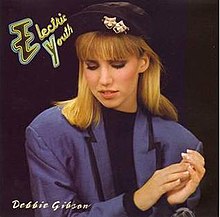Electric Youth (song)
| "Electric Youth" | ||||
|---|---|---|---|---|
 | ||||
| Single by Debbie Gibson | ||||
| from the album Electric Youth | ||||
| B-side | "We Could Be Together (Campfire Mix)" | |||
| Released | April 18, 1989 (U.K.) June 26, 1989 (United States) | |||
| Recorded | 1988 | |||
| Genre | ||||
| Length | 4:55 | |||
| Label | Atlantic | |||
| Songwriter(s) | Deborah Gibson | |||
| Producer(s) | Fred Zarr | |||
| Debbie Gibson singles chronology | ||||
| ||||
| Music video | ||||
| Electric Youth on YouTube | ||||
"Electric Youth" is the seventh single by American singer-songwriter-actress Debbie Gibson, and the second from her second album Electric Youth. Produced by Fred Zarr and engineered by Phil Castellano for BiZarr Music, Inc. and released in 1989, it became one of her most famous songs, peaking at number eleven on the Billboard Hot 100 and fourteen on the UK Singles Chart. Douglas Breitbart was the single's executive producer.
Gibson had written the song as a statement about how young people of that era were seen and how their ideas were often ignored. As a teenager herself, she was a firm believer that the beliefs and ideas held by young people were just as important as those held by adults and the song reminded people of this. It also reminded them that the current youth would become the next generation of adults.
In 2012, Gibson re-recorded the song as "Electric Youth Reloaded", featuring arrangement and rap lyrics by Jace Hall.[1][2]
Critical reception[]
Bryan Buss from AllMusic described the song as "a bouncy, frenetic song that is ridiculously sing-alongable, but at the same it is time hard to really identify with it unless you're 12 (or at least young at heart)."[3] The Daily Vault's Christopher Thelen noted that it "capture the playfulness of Gibson's music and the carefree feeling of youth."[4] Pop Rescue said it is "by far the best song" on the album.[5]
Music video[]
The music video for the song was directed by Gibson and Jim Yukich and was nominated for a moonman at the 1989 MTV Video Music Awards for Best Art Direction in a video.
In 2006, elements of the music video (particularly the silhouette dance clips) were parodied by Cobie Smulders in the sitcom How I Met Your Mother for her character Robin Sparkles' own 1990s ("The 80's didn't come to Canada 'til like '93."[6]) hit single, "Let's Go to the Mall."[7]
Track listing[]
All songs are written by Deborah Gibson
| No. | Title | Length |
|---|---|---|
| 1. | "Electric Youth" | 4:55 |
| 2. | "We Could Be Together" (Campfire Mix) | 5:33 |
| No. | Title | Length |
|---|---|---|
| 1. | "Electric Youth" (Deep House Mix) | 7:35 |
| 2. | "Electric Youth" (Shep's House Dub) | 5:55 |
| 3. | "Electric Youth" (7" Version) | 4:57 |
| 4. | "Electric Youth" (The Electro Mix) | 6:35 |
| 5. | "Electric Youth" (The Electro Dub Gone Haywire) | 6:32 |
| 6. | "We Could Be Together" | 5:33 |
- Other Version
- 7th Heaven Club Mix - 6:49
Charts[]
Weekly charts[]
|
Year-end charts[]
Certifications[]
| |||||||||||||||||||||||||||||||||||||||
References[]
- ^ "Electric Youth Reloaded". Debbie Gibson Official Website. Retrieved October 11, 2020.
- ^ Hall, Jace. "Electric Youth Reloaded by JaceHall". SoundCloud. Retrieved October 11, 2020.
- ^ Buss, Bryan. "Debbie Gibson – Electric Youth". AllMusic. Retrieved November 10, 2020.
- ^ Thelen, Christopher (February 14, 1999). "Electric Youth – Debbie Gibson". The Daily Vault. Retrieved November 20, 2020.
- ^ "REVIEW: "ELECTRIC YOUTH" BY DEBBIE GIBSON (CD, 1989)". Pop Rescue. July 18, 2014. Retrieved December 4, 2020.
- ^ "Quotes from "How I Met Your Mother: Slap Bet"". IMDb. Retrieved August 5, 2017.
- ^ Video on YouTube
- ^ "Australian-charts.com – Debbie Gibson – Electric Youth". ARIA Top 50 Singles. Retrieved October 26, 2013.
- ^ "Ultratop.be – Debbie Gibson – Electric Youth" (in Dutch). Ultratop 50. Retrieved October 26, 2013.
- ^ "Item Display – RPM – Library and Archives Canada (Top Singles – Volume 50, No. 5 May 29, 1989)". RPM. www.collectionscanada.gc.ca. Archived from the original on March 4, 2016. Retrieved April 30, 2012.
- ^ "Eurochart Hot 100" (PDF). Music & Media. May 27, 1989. Retrieved September 25, 2020.
- ^ "The Irish Charts – Search Results – Electric Youth". Irish Singles Chart. Retrieved October 26, 2013.
- ^ "Nederlandse Top 40 – Debbie Gibson" (in Dutch). Dutch Top 40. Retrieved October 26, 2013.
- ^ "Dutchcharts.nl – Debbie Gibson – Lost in Your Eyes" (in Dutch). Single Top 100. Retrieved October 26, 2013.
- ^ Fernando Salaverri (September 2005). Sólo éxitos: año a año, 1959–2002 (1st ed.). Spain: Fundación Autor-SGAE. ISBN 84-8048-639-2.
- ^ "Official Singles Chart Top 100". Official Charts Company. Retrieved October 26, 2013.
- ^ "Debbie Gibson Chart History (Hot 100)". Billboard. Retrieved November 20, 2014.
- ^ "Debbie Gibson Chart History (Dance Club Songs)". Billboard. Retrieved November 20, 2014.
- ^ "Offiziellecharts.de – Debbie Gibson – Electric Youth". GfK Entertainment Charts. Retrieved May 22, 2019.
- ^ "The ARIA Australian Top 100 Singles Chart – 1989". ARIA, via Imgur.com. Retrieved January 7, 2020.
- ^ "American single certifications – Debbie Gibson – Electric Youth". Recording Industry Association of America.
External links[]
- "Electric Youth" at Discogs (list of releases)
- 1989 singles
- 1989 songs
- Debbie Gibson songs
- Song recordings produced by Fred Zarr
- Songs written by Debbie Gibson
- Atlantic Records singles